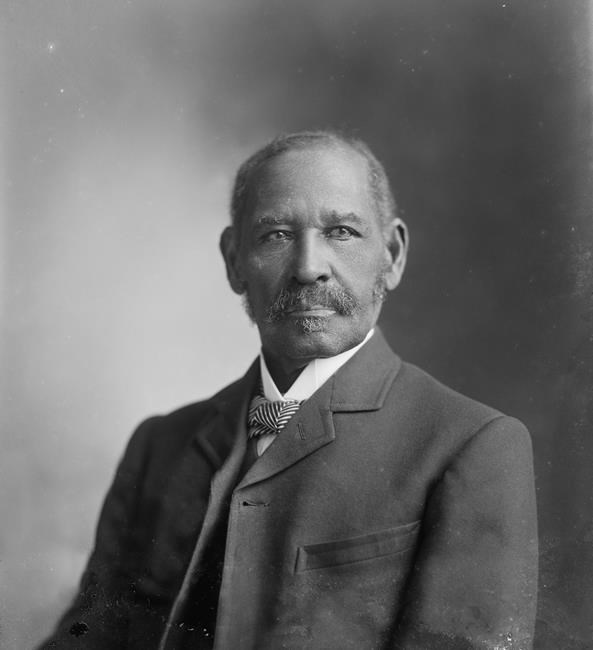VICTORIA — The first Black person elected in British Columbia was an American abolitionist and entrepreneur who won a Victoria city council seat in 1866 and played a role in Confederation.
In 1858, about 800 Black people left San Francisco for the promise of better lives on the colony of Vancouver Island.
Mifflin Gibbs was among the early arrivals to Victoria and nearby Salt Spring Island.
"He represents a hero," said Silvia Mangue, president of the B.C. Black History Awareness Society. "For us he represents a role model of the person we all want to be. He left this legacy. He opened this path. That is powerful."
Gibbs grabbed hold of the opportunity he didn't have in the United States because he was Black and turned it to success in Victoria, she said.
He opened a downtown business selling tools, supplies and provisions to the thousands of people arriving in Victoria on their way to strike it rich at the Cariboo Gold Rush and he immersed himself in local politics, said Mangue.
"At the time the Victoria city budget was financially really bad and he fixed the budget of the community," she said, describing him as a pioneer.
"The guy left a huge legacy."
Gibbs was among the hundreds of Black people who arrived on Vancouver Island at the invitation of Gov. James Douglas who promised them the freedom they had never known, said Prof. John Lutz, a University of Victoria historian.
"They found themselves officially welcomed in B.C.," he said. "They had rights to testify in court and they weren't going to be hauled off and accused as runaway slaves. They could own property, and if they naturalized as British citizens they had the franchise, the vote, which they didn't have in California."
But the invitation to the Black pioneers to settle on Vancouver Island contained an ulterior motive on the part of the colonial government, which looked to the new arrivals to help thwart local factions who supported joining the U.S., Lutz said
The new arrivals were subjected to paternalism by the British establishment, but they faced outright racism from many of the American gold seekers, he said.
"There was racism here but people like Mifflin Gibbs managed to rise above it and the racism was nothing like in California," he said. "In many ways it was a better situation, but it certainly wasn't perfect."
Gibbs stayed near downtown Victoria, becoming politically active, running his business ventures and living in the James Bay neighbourhood with his wife and five children, while others left the city to establish communities north of Victoria on the Saanich Peninsula and on Salt Spring Island, Lutz said.
Gibbs also played a role in historic talks that ultimately saw the colonies of Vancouver Island and B.C. join Confederation in 1871, said Lutz.
Gibbs was one of the 26 delegates who attended the pro-Confederation gathering in Yale, B.C., in 1868, he said.
B.C. was in a deep recession following the Gold Rush and making debt relief one of the conditions to join Canada was a topic of debate at the convention, Lutz said.
"The convention did much to stimulate popular support for the union with Canada as a solution to the colony's problems," says a B.C. government plaque erected at Yale.
Mayor Lisa Helps said Gibbs was a symbol of Victoria's history as an open city, but one with flaws that still exist today.
"He was a mover and a shaker at the time," she said. "Even though, obviously, racism existed, just like it still does today, there was a certain sense of being a bit of a global city open to having people from around the world."
The B.C. Black History Awareness Society website includes a letter Gibbs mailed to a San Francisco newspaper shortly after his arrival in B.C., highlighting his impressions.
"The country is certainly a beautiful one — a country good enough for me — and I am sorry to be so far behind. If either of us had arrived here two months ago, worth $1,000, we could have been worth $10,000 today."
The city proclaimed Mifflin Wistar Gibbs Day on Nov. 16, 2016, in recognition of his election to city council on the same day in 1866.
A plaque honouring Gibbs, who returned to the United States in 1870 where he was elected a judge in Little Rock, Ark., and later appointed U.S. consul to Madagascar, was erected in 2019 in Victoria's Irving Park near his former James Bay home.
Verna Gibbs, a great-great-grandniece of Gibbs, travelled from San Francisco in May 2019 to attend the ceremony unveiling the Historic Sites and Monuments Board of Canada plaque.
"After helping lead the exodus of 800 Black residents from San Francisco in 1858, Gibbs became the recognized leader of their community on Vancouver Island," the plaque states.
"He strove to make these newcomers a force in colonial politics and, as a member of Victoria city council, he became the first Black person to hold elected office in B.C. This innovative entrepreneur, who invested in mining and trade, also encouraged the integration of Black settlers and advocated for their rights."
This report by The Canadian Press was first published Feb. 17, 2021.
Dirk Meissner, The Canadian Press



